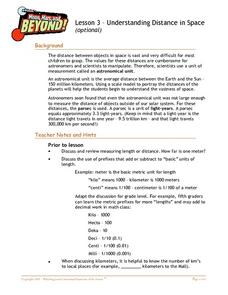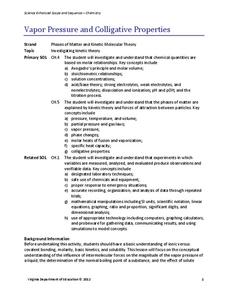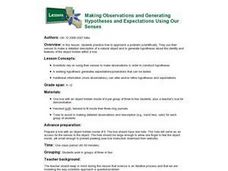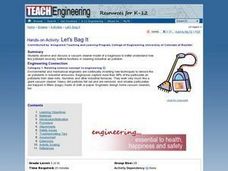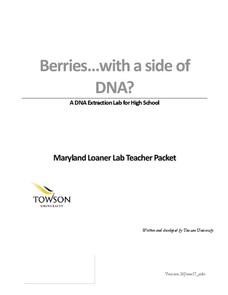Curated OER
Understanding Distance in Space
Young scholars discover the vocabulary used for distances in space and review measurement units and instruments before creating a scale model of the planets. They determine how to calculate the relative distances between the planets...
Curated OER
Food or Fuel?
High schoolers describe the process of transesterification utilizing chemical formulas. They construct and compare models of chemical structure of the substances involved in biodiesel production such as: alcohols, alkenes, alkanes,...
Curated OER
Animal Characteristics
Students investigate the characteristics of animals by creating a chart. In this animal life lesson, students create a KWL chart listing all the different animals a class can name. Students take a field trip to a science facility to get...
Virginia Department of Education
Vapor Pressure and Colligative Properties
Hate to vacuum, but enjoy using a vacuum pump? Explore a instructional activity that starts with a demonstration of boiling water at various temperatures by using a vacuum pump. Then scholars design their own experiments to measure vapor...
Virginia Department of Education
Thermochemistry: Heat and Chemical Changes
What makes particles attract? Here, learners engage in multiple activities that fully describe colligative properties and allow the ability to critically assess the importance of these properties in daily life. Young chemists...
Virginia Department of Education
Partial Pressure
At some point, everyone has been under pressure—even Dalton! Explore Dalton's law of partial pressures with young chemists as they measure the volume of air extracted from a sample compared to its original volume. Class...
Earth Watch Institute
Entering Local Groundhog Data in an Excel Spreadsheet
Here is a cross-curricular ecology and technology lesson; your learners create spreadsheets depicting the location and number of groundhog dens in a local park. They research groundhogs and analyze data about where the groundhog...
Gallantsbiocorner.com
Cell Organelles
Young scientists take a trip into the microscopic world of cellular biology with this practice exercise. Given pictures of different organelles, students must correctly identify specific parts of each cellular structure to demonstrate...
Mascil Project
Pottery
Don't cry over broken pottery. A cross-curricular lesson challenges pupils to consider how to restore ancient pottery. Using a computer program and their knowledge of transformations, they come up with a way to recreate the original...
Curated OER
Inquiry into Consumer Products
Students recognize different consumer products, found in and around the home, that have reactive or denaturing properties when used together. They explore chemical and physical properties of each product by identifying chemical formulas...
Curated OER
Making Observations and Generating Hypotheses
Learners practice how to approach a problem scientifically. They use their senses to make a detailed description of a natural object and to generate hypotheses about the identity and features of the object hidden within a box.
Curated OER
Citizens For the New Zoo
Third graders complete Internet research to find information about an animal and its basic needs. They design a model of a zoo habitat that would accommodate their animal. They write a letter of recommendation to a Zoo board of directors...
Curated OER
Let's Bag It
Students observe and discuss a vacuum cleaner model of a baghouse to better understand how this pollutant recovery method functions in cleaning industrial air pollution. They give examples of when the use of a baghouse is appropriate,...
Curated OER
Sea Floor Spreading I
Students use Excel to explore the geodynamics Model equation for ocean depth around a sea-floor spreading center. They complete an introductory tutorial on Excel for students with no prior Excel experience.
Curated OER
Seeing the World Through A Different Lens
Students participate in activities in which they model different disabilities. They discuss their experiences as a class. They work together in groups to discuss how to improve an adaptive device.
Curated OER
Systems of the Body
Third graders gather information by questioning, forming hypothesis, collecting and analyzing data, reaching conclusions and evaluating results, and communicating procedures and findings to others. Then they demonstrate an understanding...
Community Resources for Science
A Whole New World of DNA and Proteins
Lead your young scientists into an exciting world as they participate in a role play and experiment focused on proteins and DNA. After researching the Central Dogma of Biology, individuals or groups participate in a classroom...
Science 4 Inquiry
Edible Plate Tectonics
Many people think they can't observe plate tectonics, but thanks to GPS, we know that Australia moves at a rate of 2.7 inches per year, North America at 1 inches per year, and the Pacific plate at more than 3 inches per year! Scholars...
Towson University
Berries...With a Side of DNA? (High School)
Is DNA still present after picking fruit or cooking vegetables? Biology scholars extract and collect DNA strands in an impactful lab. Working groups prepare their samples and compare their results to negative and positive standard...
Curated OER
Wind Power
What a wonderful way to explore wind power! Through this lesson, learners get a background in the history of wind power, create their own wind turbine, and the test their designs. This is a terrific way to tie scientific principles to...
Curated OER
A Comparison of Cloud Coverage Over Africa
Students use a NASA satellite data to contrast amounts of cloud coverage over different climate regions in Africa. They explore how Earth's major air circulations affect global weather patterns, and relate to local weather patterns.
Curated OER
Cycles and Starting Mealworms
Here is a fascinating lesson about the life cycles of plants and animals, and other cycles found in nature. Learners explore the cycle of the moon, the tides, and other sequences of events in every day life. The big activity is the...
NASA
The Cycle of Matter
An educational lesson focuses on the idea of conservation of matter through a demonstration of the water cycle, a discussion of digesting food, and the path of carbon and oxygen atoms as they change form.
Curated OER
Galaxy Adventure
Working in groups, learners create a mnemonic device, give an oral presentation, and create a pictorial representation of the correct sequence of the planets and asteroid belt from the sun. An assessment rubric is included in the lesson.
